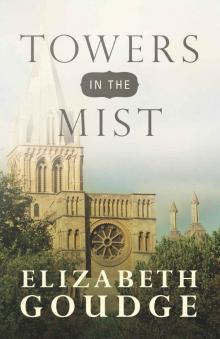- Home
- Elizabeth Goudge
Gentian Hill Page 2
Gentian Hill Read online
Page 2
The dingy place was not more than five feet high and twelve feet square, and into this space was crowded a table, used by the midshipmen for their meals and by the surgeon as an operating table when the ship went into action, the midshipmen's chests, their hammocks, and themselves. The reek of the bilges below, mixed with the smell of rancid butter and putrid cheese from the purser’s storeroom nearby, was horrible, and coming into it Anthony wondered dully, as always, how he would endure it for four mortal hours. But the noise was worse, for the elder gentlemen were getting round the table for their nightly rum-drinking, and the younger ones were tumbling into their hammocks. Anthony’s entry was the signal for the usual jeers and catcalls, but apart from that he was not tormented tonight; brutal though the population of the after cockpit might be on this ship, they knew when a man had had enough. No one helped him sling his hammock, or get him a drink, and his struggle to do these things for himself was the subject of much merriment, but when he had accomplished them, he was let alone to sleep if he could.
And astonishingly, in spite of his aching limbs and splitting head, after an hour or so of misery he dropped into a queer feverish sort of sleep, awakening from it suddenly to find himself in the most peculiar state of mind.
A grownup would have recognized it as a subtle form of temptation, very likely to attack one during a wakeful hour of the night when vitality is at its lowest. Because it suddenly seems impossible to go on, values are abruptly turned upside down. To endure – which perhaps a mere half hour before was the right and obvious thing to do – is now presented to the mind as simply ridiculous; escape, which would have seemed despicable a little while ago, now seems to be the only sane course of action. The experienced man knows that it is not impossible to go on because one thinks it is, that you can always go on in some manner while the power of choice remains. This sudden reversal of the values is a temptation to preordain the moment when a man can no longer make his choice, and his responsibility for what happens next must be laid down. Faced with it, the experienced man once more chooses to come to grips with the impossible and finds it possible.
But Anthony was not experienced, and to him it seemed perfectly simple. He was not aware of any temptation. His mind was absolutely clear. He had endured as long as he could, and now he was going to get out.
2
Five minutes later, before any doubts had had time to obtrude themselves, the middle watch was called, and he fell out of his hammock, fully dressed as he had dropped into it, and staggered up on deck. It was a still night, and a slight sea mist had crept up after sunset, so that he could tell the whereabouts of Torquay only by the gleam of lights still burning in the inn, and by the harbor lanterns. No more perfect night for escape could have presented itself; the dim glimmer of light was sufficient to guide him, but his body in the water would not be seen. He knew exactly what he was going to do. His mind had that extraordinary lucidness that comes sometimes at the peak of fatigue, just before bewilderment comes down like a blanket and smothers thought.
The middle watch, with the ship at anchor in home waters in fine weather, was a routine affair. The officer of the watch on the poop, the sentries and helmsman at their appointed places, were peacefully inattentive. As they were at anchor, with no danger threatening, the boatswain’s mates, who usually walked round with their starters to tickle up any man who looked like falling asleep, were absent. There was no sound but the lap of the water against the ship’s side and the occasional cry of "All’s well" from a sentry. Anthony with another midshipman kept watch upon the forecastle.
He waited patiently, alert and attentive to his duty, until the very last hour of the watch, when vigilance was relaxed to the minimum, and he found himself with no eye upon him. He took off his short dark blue coat with its brass buttons, his nankeen waistcoat and black silk neck-handkerchief, and stowed them in a corner with his three cornered hat and his dirk. Then, wearing nothing but trousers and frilled white linen shirt, with his thin heelless black shoes stuck in his pockets, he crept down the main hatchway to the deck below, and down again to the lower gun deck. It was such perfect weather that the gun ports were open, and he was so thin that it was not hard to slip through one of them, cling by his fingers for a moment, then let go.
He had thought that he had so short a distance to fall that there would not be much splash, but the noise he made seemed to burst in his ears like the explosion of a cannonade. Yet when he came up choking with sea water and panic, he heard no shouts behind him and guessed that, if anyone had heard the splash, they had thought it was the cook chucking out rubbish, for work in the galley started about four o’clock. Reassured, he struck out instantly for the shore, guided by the glimmer of the harbor lanterns. He was a good swimmer, and he had not thought it would be difficult; yet now he had his second moment of panic, for his stiff, aching limbs were like lead. Then the panic passed. Drowning or that village-it did not really matter which. Either was escape.
He got there, and clung more dead than alive to an iron ring in the harbor wall beside a flight of steps. Then somehow he got on the steps and crawled up them. Though it was still dark, he remembered the lay of the land from his vision of the village the evening before, and he made his way along the harbor to the ship-building yard. There, in the lee of a half-built fishing smack, he wrung the water out of his trousers and shirt as well as he could, put on his soaking shoes, and lay down to wait for dawn.
It came quite soon, with its inevitable quickening and reassurance, and that interpenetration of light and sound and scent by each other that one seems to notice only in moments of deep peace. The crying of the awakening gulls, the soft slap of the sea against the harbor wall, the running of the stream, the sound of an opening door and a voice singing, a church clock striking the hour, made music that was a part of the growing pearly light. There was a faint scent of seaweed, of baking bread, and that indescribable fresh smell of the dawn compounded of dew-drenched flowers, wood smoke, and wet fields. That, too, was a part of the music and the light, and all of them together were like a personal presence, coming to him and wrapping itself about him like a cloak, so that for a few moments he ceased to be aware of the shivering of his body and felt a glow all through him, the warmth of a fresh beginning and a new day.
It passed, and he was shivering again, but the reassurance remained. He came cautiously out into the open and looked about him. The whole world now was sparkling with clear light, and he had to shield his eyes against the dazzle of the sun rising like a ball of fire out of the sea. His Majesty’s ships, resting in painted glory upon the sparkling water, looked unearthly in beauty; who could have guessed that their loveliness held such misery? His reassurance was suddenly shattered, for they seemed to be all eyes, searching for him.
He looked quickly away from them to the white cottages in their flowered gardens, the stream slipping like a silver ribbon under the stone bridge and across the field, the green hills and the wooded valleys. He saw now that the valley up which he had imagined himself walking, following the stream, was not unpopulated. There were white houses of a most genteel appearance among the trees. He realized that this was a bigger place than he had thought-almost the beginning of a fashionable watering place. He would not dare go up among those formal houses in search of his ivy-covered one, for they looked just like the sort of homes that might contain naval officers on leave, and bedraggled though they were, his midshipman’s frilled shirt and nankeen trousers were perfectly recognizable to a knowledgeable eye; and the floggings delivered to captured deserters had been known to kill them. Somehow he must get food, but he would beg it from poor folk who, if they recognized him, would be less likely to give him away.
Smoke was curling up now from the chimney of the inn, and it was from its open doorway that there floated the delicious smell of baking bread and the sound of a man’s voice singing very beautifully to the music of a guitar. It was not an English voice. He guessed there must be a foreign seaman there, and looking around
he was not surprised to see a small Portuguese privateer anchored among the English fishing boats. These little piratical ships of the allies nosed their way about the world in an extraordinary way, and this one, judging by her battered appearance, had had some rough handling from storms or the enemy, and had put into harbor to refit. Sailors in a foreign port were notoriously open-handed. They’d share their breakfast with him. It seemed crazy, perhaps, not to get right away from the village before he tried to get food, but without something to eat he knew he’d not get anywhere.
The cob-walled, white-washed inn stood in its gay garden just beyond the stone bridge, and the swinging sign pro- claimed it "The Bird in Hand" by a motto painted on the board.
A bird in hand is better far
Than two birds in the bushes are.
Dizzy and sick, with such a singing in his ears that he could scarcely hear the music of the guitar, Anthony leaned in the doorway and looked in. Half a dozen bronzed seamen, gold rings in their ears, bright handkerchiefs bound around their heads, were sitting about the table munching bread and bacon, washing it down with copious draughts of ale. The singer, a young man, had finished eating but wetted his whistle between songs. Their shirts were clean, their faces shaved, and they seemed in high good humor. The kitchen had a sanded floor and brightly burning fire, and a fresh- faced woman was busy about her morning’s work as though she liked it. There was an air of warm festivity about the scene, the invitation and friendliness of a great occasion, and letting go of the door jamb, Anthony fell plop into it, as a gasping fish falls off the gunwale of a boat into the reviving water.
When he came to himself again, he was lying on the settle by the fire with the woman bending over him with a glass in her hand. "Drink it up, love," she advised him, and clinked the glass against his teeth. He gulped down the fiery stuff and presently sat up and rubbed his knuckles in his eyes, smiling sheepishly. "Soaked through and hungry," diagnosed the woman. "Sit there and dry off, boy, and eat a good break- fast." She brought him bread and bacon and hot milk, and he did as he was told, gratefully aware of the kindly concern of the men about the table and the motherliness of the woman that were like balm after the brutality of the past weeks.
"One of you?" she enquired of the men. "Been off on the spree by himself? He’s got his heathen beads ’round his neck, poor lamb." Anthony’s shirt had come undone and she could see his rosary. Coming to him with another slice of bread, she picked it up and dropped it again with kindly contempt. The Portuguese seamen, scarcely understanding her, shook their heads but smiled companionably at Anthony, and he noticed that they were all wearing rosaries. Apparently this festival, into which he had fallen headlong, was a religious festival. He smiled back as he munched, making himself one with them in whatever it was that they were celebrating.
"It’s a queer thing, how it goes on," said the woman. "For hundreds of years, now, not a Popish ship comes into Torbay but some of the seamen must be landed to go and do their heathen antics in St. Michael’s Chapel. You don’t know why you do it, and neither do we, but so it goes on. Some sort of pilgrimage. They give thanks, they say, but I doubt if they know for what."
"Escape," suggested Anthony timidly.
The woman looked at him thoughtfully. "They do say that chapel was built by a sailor who’d been saved from drowning in some storm. But I don’t know the story rightly. Some sort of an old legend. Hundreds of years ago it was, and I’ve no time for such nonsense. Have a bite more, boy? You can twist your tongue ’round a bit of English, it seems. What’s your name?"
"Anthony." He still spoke softly and timidly, and the name was unfamiliar to her.
"Zachary," she repeated. "Odd, now, to have a good old English name fastened on a poor Popish foreign lad."
He did not correct her. Zachary, he thought, would be as good name as another for him to be known by in a new life. Anthony was dead. Now he was Zachary. The men got up, and he got up too, for it seemed that he was one with them in this pilgrimage.
The woman came to the door to show them the way. "Cross the bridge over the Fleete and go along Cane’s Lane," she said, "and up over the cliff by Ladybird Walk, and then you’ll see Torre Church and St. Michael’s Chapel. You can’t miss them."
3
The little party crossed the bridge and made their way along the lane beside the stone wall, past the five white houses standing in their bright gardens. The Portuguese sailors were merry, singing and laughing and chattering to each other. They leaned over the walls of the gardens and picked sprays of tamerisk and fuchsia, and stuck them behind their ears. One of them flung a posy to Zachary, who was sticking to them like a forlorn, disreputable dog, trying to keep their comforting bulk between himself and the sea, for now that be was out in the open again, there had come upon him once more that horror of the eyes of the ships. The food and kind- ness at the inn had put new strength into him, but he still felt dizzy in the head and heavy about the feet, as though a bushel of mud were clinging to each of his wet shoes, and it was with dismay that he realized that there was no way around under the towering rocky cliff that enclosed Torquay upon the south, and they had to climb up over it by the pathway that their hostess had called Ladybird Walk. Yet he still continued to follow the others, for he had no idea in his head now except just to go where they went.
The path climbed steeply upwards, bordered by rocks and gorse bushes, and stunted rowans clinging wherever they could find a foothold of earth. Zachary was too occupied in dragging himself up to look about him as they climbed, but when they reached the summit of the cliff he stopped with the others and sat down on a rock, his head in his hands, to get his breath. All about him he heard guttural exclamations of delight, and presently he stood up and looked about him.
It was incredibly beautiful. He could see the whole glorious stretch of the bay, and the green and wooded hills piled about it, and to the west high peaks of purple moorland, sharp and clear against the sky. Between the bay and the distant moors he could see the rise and fall of hills and valleys patterned with green pastures, harvest fields, copses, and orchards, and could guess at the peaceful villages, farms, and churches folded among them. He thought with an aching heart of those quiet farms. He knew little of country life. Bath and the misery of the past few weeks was all that he knew, but he thought that if he could only get to one of those farms he would be safe there and have peace. Some farmer would surely give him work. It couldn’t be difficult to learn to plough and milk cows and shear sheep. He would make his way inland, he decided, when this pilgrimage was over. He would leave it until later to see if the ivy-covered house really existed.
Then he tore himself away from the thought of the quiet farm where he would End sanctuary, and looked down to the scene below them to the south. He could see a beautiful house with what looked like the ruins of some great abbey, surrounded by gardens and orchards, and parkland where deer were feeding, the whole bounded upon the east by a strong sea wall.
Between the abbey and the top of the cliff where they stood. were two hills. The one nearest to them was low and green and tree-covered, and among the trees were a few small houses and an old grey church with sheep feeding in the churchyard. It must have been the bell of this church that Zachary had heard before for now it tolled out the hour, clear and sweet, the voice of the bell joining itself to the bleating of the full-grown lambs.
The other hill was rocky and precipitous, and built upon its summit was the Chapel of St. Michael, the goal of the pilgrimage. Gulls circled about it and it was so old and weatherworn that it seemed a part of the rock upon which it towered, and strangely lost in the midst of the peaceful pastoral landscape. It would have looked more at home, Zachary thought, on a rock in the middle of the sea. Yet it was a fitting shrine to have been built by a seaman who had been saved from death in a storm, and a fitting place of pilgrimage for other seamen who were holding their lives in their hands in days of peril. For though one might forget on this golden August morning, with the painted battl
eships apparently asleep there on the painted sea, that half the nations of Europe were at war, and England fighting for her life, one remembered it when one looked at that chapel. It had a look of vigilance about it, of endurance. It might have been St. Michael himself standing with drawn sword to keep watch over this lovely land.
Silently the little company filed down the steep path to the green valley below, skirted the hill where the church stood among its trees, and came to the foot of the limestone precipice up which they must climb to reach the chapel. It was a steep climb, but the feet of many pilgrims had made a path, and there were rocks and bushes to give handhold. 'The thirteenth century building at the top was a strange, hare little shrine. There was no door in the arched entrance, no glass in the narrow windows. The floor was of rough rock, and sloped steeply upward from west to east. The walls were three feet thick, and the barrel-vaulted roof was composed of small stones. A little of the original plaster clung to roof and walls, and there was a plain piscina in a niche in the south wall to show that once there had been an altar here, and two empty niches in the north wall, with what looked like a fleur-de-lis carved in the stone between them. The solid little place looked now less like a shrine built by man than a cavity hollowed out of the solid rock by wind and rain as a refuge for all storm-battered creatures. The storm of a low nights past had evidently swept through it, for it was fresh and clean. And it had the compelling power of places that have been used for prayer, and nothing but prayer, for generations.
The seamen filed reverently in through the archway in the north wall and knelt upon the rough rock, giving thanks for whatever deliverance it was that had left their ship so battered but themselves unharmed, and for a little while there was no sound but the click of their beads, the crying the gulls who circled about the chapel, and the beating of their wings. Zachary knelt just inside the door and took off his rosary. His beads slipped through his fingers, but his weary mind was a blank, he gave thanks for nothing in particular, prayed for nothing in particular, merely stayed himself upon the fact of the safety of this place. Looking out of the narrow windows he could see only the sky and the gulls; he could not see the ships, and their searching eyes could not see him. He was safe from them in this impregnable cell of stone, high up in the sky upon this rocky precipice.

 The Rosemary Tree
The Rosemary Tree The Dean's Watch
The Dean's Watch Linnets and Valerians
Linnets and Valerians Gentian Hill
Gentian Hill B00DRI1ZYC EBOK
B00DRI1ZYC EBOK B008O6ZWTG EBOK
B008O6ZWTG EBOK The Scent of Water
The Scent of Water Pilgtim's Inn
Pilgtim's Inn Island Magic
Island Magic Pilgrim's Inn
Pilgrim's Inn Towers in the Mist
Towers in the Mist Green Dolphin Street
Green Dolphin Street The Bird in the Tree
The Bird in the Tree The Child From the Sea
The Child From the Sea My God and My All: The Life of Saint Francis of Assisi
My God and My All: The Life of Saint Francis of Assisi The Little White Horse
The Little White Horse My God and My All
My God and My All B00CKXCNH8 EBOK
B00CKXCNH8 EBOK